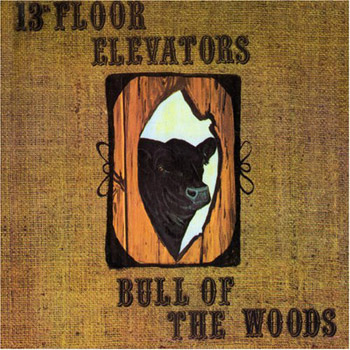
Bull of the Woods by 13th Floor Elevators (1969)
Who are the 13th Floor Elevators? If you can even recognize the name of the band at all, you might wonder, "Aren't they that group from back in the sixties that did that really edgy tune called 'You're Gonna Miss Me?' Hey, didn't some computer company do a TV ad recently where they sampled the part from that song where the lead singer howls like a demented jungle creature?" Other casual listeners might say something like, "Oh, yeah, the 13th Floor Elevators, they did a lot of acid, man! They were a really tripped-out group, dude!" Finally, you might talk to someone who is a fan of Roky Erikson, generally known as the group's lead singer, and probably most famous for doing the lead vocal on "You're Gonna Miss Me." Such a person might think of the 13th Floor Elevators as the group that backed up Roky Erikson.
So, it might come as a surprise to such people that, in reality, the best album by the 13th Floor Elevators does not include "You're Gonna Miss Me," is not necessarily a psychedelic album per se, and was mostly the brainchild of guitarist Stacy Sutherland, not Roky Erikson, who was largely absent from the recording process.
Who was Stacy Sutherland? Little is known about him. But his haunting vocal presence permeates much of album. His strangely melancholy and detached Texas drawl, soaked in reverb throughout the album, seems to be calling out to the listener from behind a wall of thick incense. The guitar work is minimalist, complex, traditional, unconventional and compelling all at once. I haven't found out if Sutherland or Erikson came up with the guitar parts, but the evidence seems to point more to the former than the latter.
Bull of the Woods is a milestone album in two ways. First, it marks the tail end of the psychedelic music era. Perhaps this is more evident in the reverb-heavy recording technique than anything else. It has a definite country and blues feel to it, similar in some ways to Grateful Dead compositions of the era, but rougher, stranger, more abstract and briefer. And with all that, it is a bona fide American album, despite a few discreet borrowings here and there from the Moody Blues' sonic palette. Secondly, the album marked the end of the 13th Floor Elevators as a functioning group. Talk about going out with a bang.
Sadly, the production quality of the recording is not the best. You can only imagine how much better the album might have sounded if someone like Phil Spector had produced it. That being said, the rough edges of the production give the album an odd kind of authenticity. You kind of like it more because it isn't slick. The musicians aren't particularly famous, and neither are you. So, you can like the album all the more for that. You've discovered something special that most people don't even know about.
The most noteworthy compositions on the album are as follows:
"Scarlet and Gold" may be the best song on Bull of the Woods. Anchored by a solid bass line, heavily colored with majestic and layered backing vocals with a bit of Moog synthesizer floating in every now and then, carried onward and upward by an inventive and expressive drumbeat, lent an air of otherworldliness by Sutherland's vocals, and featuring an awe-inspiring guitar solo in the middle, the tune seems custom-made for the Fillmore West in San Francisco in 1969. Who knows, it might have been played live there that very year.
"Street Song" is a meditative yet frenetic blend of icy, naked, reverb-and-delay-drenched guitars bounding forward like a pickup truck driven a bit too fast on a rural dirt road. The singer's tone is despondent and disconnected: "I saw the ghost of our wrecked romance; it was lost in the pouring rain."
"Rose and Thorn" is a unique song for its structure and sound. The concept of verses and choruses does not exist here; rather, it is a series of largely dissimilar movements inventively strung together as a whole. All too soon, it is over, like an insightful dream that upon waking is difficult to comprehend. Here, the influence of the Moody Blues is apparent, but in an almost proto-punk way.
Honorable mention should be given to some other tunes:
"Livin' On" (with Erikson on vocals) deserves special mention for the very thick and heavy guitar part and freak-out vocal delivery.
"Barnyard Blues" gets high marks for the major groove factor going on there. I have to wonder if the Grateful Dead borrowed a bit from this tune for "Easy Wind."
"Never Another" should probably be included among a select handful of late-1960s songs that would have a decisive formative influence upon the coming punk rock movement.
Overall, it is a great album, worth listening to several times, filled with different textures, moods and styles. It is also highly underrated. This would be a nice one to add to your music collection and play at a social gathering, then ask people to guess who it is without allowing them to look.
Reviewed by Somebody Else 10/1/10
See more Favorite Albums of the Moment





